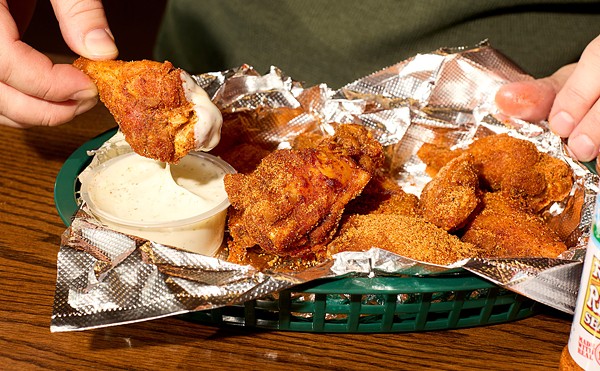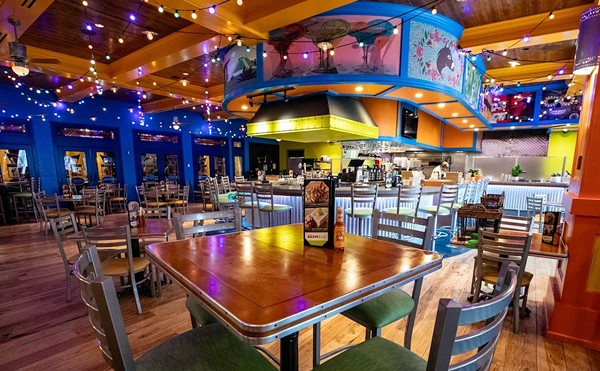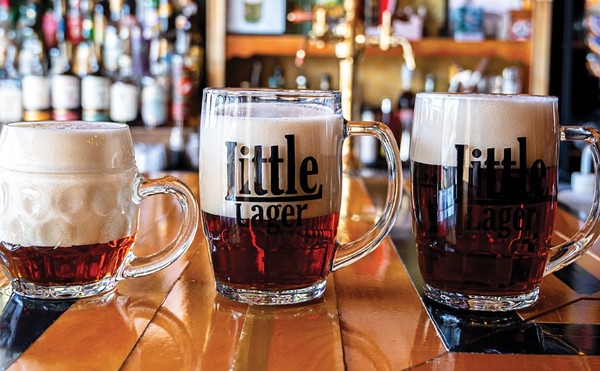The preoccupation with "local" foods is, at best, like water in plastic bottles and unlikely, hypochondriacal food allergies, an upper middle-class fetish. Saddled with too much income and untethered by the discernments of a serious education, they roam the more barren plains of the cultural landscape, looking for any place that will offer them some sense of specialness. These are the same people who contribute money to combat clinical depression in polar bears. Or bring electricity to needy Amish. Those people who don't have any kids of their own and who buy yours those stupid wooden craft fair toys as gifts? Likely locavores. Insisting on eating locally is an affectation, a posture. Locavores are the sorts who live in constant fear of being identified with the McRib-gobbling proletariat.
Push the hyperbole aside -- you really have to put your shoulder into it, but still -- and Lowry makes a couple of good points about the practical limitations of locavorism. Yet most of his diatribe is only tangentially related to the pros and cons of locally farmed or raised food.
In truth, it's a raging against the death of a certain way of thinking about our relationship to what we eat.
The most obvious criticism of "The Locavore's Dilemma" is also the least interesting. Yes, Lowry draws a ridiculous caricature of the locavore. His technique bears some semblance to the broad, class-based generalizations that New York Times columnist David Brooks loves to make, though while Brooks' broad brush is sincere, if flawed, Lowry's is thick with disdain:
Their condo walls are festooned with Indonesian masks and the folk-detritus of third-world cultures. Their yeasty, leftist, muffin-headed politics are iced with concerns for Amazonian tribesmen and freeing Tibet. Yet a serving of beets that didn't come of age within five miles of the restaurant where it appears on a plate turns them into snooty chauvinists.
(Yeasty?)
Lowry's dislike of locavores is directed more at their (presumed) politics than their concern about the sources of their food. He derides their "progressive, anti-capitalist sensitivities" and "eco-smugness." He compares their logic to Sean Penn's plan for world peace. The subject might be food, but this is the same reductive red/blue, left/right, us/them approach that passes for political discourse these days.
I don't know Lowry personally. I don't know -- nor, frankly, do I care -- what his politics are. However, he makes the classic conservative (in the universal sense of the term, not its specifically American political connotation) argument against any new idea. Andrew Veety, a local food blogger and occasional Gut Check contributor, summarizes this beautifully in a comment he left on Lowry's post as well as on his own blog:
Sadly, Dave's argument is additionally weakened by a secondary theme that appears throughout his essay -- namely a sense of entitlement and arrogance associated with being an accomplished eater. Without specifically saying it, the locavore is regulated to the same group as the often maligned foodie. To many, the term foodie is an affectionate term, used to describe the fraternity of eaters. The darker side of the term foodie is an insult -- a method for the experienced to point out the amateur status of another. If one can stratify eaters, one can maintain one's position at the top of the dining heap.
Are those who believe that eating has a moral and political component (to expand the discussion beyond the very few people who eat local produce exclusively) blameless? Absolutely not. Its most outspoken advocates come across as strident and out-of-touch with everyday life. Read Michael Pollan codify his beliefs into "rules" for eating or hear Alice Waters suggest that we should spend less on sneakers and cell phones and more on food, and you, too, might be tempted to reach for Lowry's poison pen.
Yet by concentrating on the extremes on either side of the issue, by falling into the easy pattern of outrage and snark, we ignore the serious questions about our eating habits that we must address, and we avoid the compromises that we must inevitably make.
Lowry begins with an anecdote:
A couple of years ago, a reader took me to task for a different reason. She didn't like my choice[for the magazine's "Restaurant of the Year"] because, for her, "the first criteria" for selecting a "best" restaurant "should be if they buy local." She adds, "First and foremost, to be a top restaurant, it should be a given that the ingredients are...as locally raised as possible."
As a restaurant critic, I, too, would find this criticism frustrating. A local product isn't necessarily a good one, and even if the product is good, a well-meaning chef still might screw it up.
In fact, there are several area restaurants that I've praised in my reviews for serving very good dishes made from quality local products. However, these restaurants are but a very small percentage of the total number of restaurants that I've reviewed positively and an even smaller percentage of the total number of restaurants that I've reviewed, period (to say nothing of the total of number of restaurants in St. Louis).
As Lowry rightly points out, albeit with a sneering hypothetical example of Burger King trying to source the tomatoes for its Whoppers in St. Louis, there is not enough land, nor are there enough farmers, nor do the appropriate distribution networks exist to support a large number of restaurants relying on local produce.
Should the use of locally sourced food be the "first" criterion for judging a restaurant? Absolutely not. On this, Lowry and I agree. It's an impossible standard.
Should the use of locally sourced food be a criterion for judging a restaurant? Yes, I believe so.
First, though, let me introduce more nuance than the cycle of outrage and snark usually allows. When we say "local," we do not mean, simply, "nearby." Rather, by "local," we mean that we, as consumers buying directly from local farmers at a market or as diners who trust the judgment of a chef who buys from local farmers, are making a concerted effort to understand how the food we are purchasing has been grown and raised. Each of us might have different priorities -- certified organic or not; grass-fed vs. corn-fed beef; how the animal was killed -- yet all of us are seeking a connection with the food we will eat and those who have grown, raised or caught it.
This is unequivocally a good thing. When local chefs demonstrate this interest in the sources of the food they serve and do it justice on the plate, they should be praised. What's more, the thought process behind it can be extended to food that isn't local. I consider myself a thoughtful eater, but not a locavore. I shop at the local farmers' markets as often as my schedule allows, but I also eat seafood (and not only when my restaurant reviews demand it).
When I spend my own money on seafood, however, I try to buy sustainable seafood -- not because it makes me feel like I'm a better person than Dave Lowry, but because I know in the long run my choice matters. And when I inevitably slip and ignore everything I just said, I do feel guilty -- not because the eco-smug socialist foodies are going to pull my membership card, but because in the long run that choice matters, too.
Speaking of seafood: Because Lowry is arguing against a caricature, without shades of gray or the opportunity for compromise, he can make statements such as this:
The simple idiocy of the locavore's position, clearly explained, is frightfully embarrassing. Missouri's tuna stocks have been tragically depleted since the closing innings of the Silurian era, when the seas retreated around here and left us several hundred miles inland. So any St. Louis eatery with tuna on the menu is -- or should be, according to locavore standards -- off their list.
I grant that there probably are a few self-described locavores in the Midwest who would refuse to eat tuna just because we live a long, long way from an ocean. Yet if we look past the cartoon to thoughtful eaters, "locavore" or not, the question of whether we should eat certain species of seafood is a vital one. Let's stick with tuna. Here's what Monterey Bay Aquarium's Seafood Watch website has to say about bluefin tuna:
All populations of bluefin tuna are being caught faster than they can reproduce. Bluefin is being further depleted by ranching operations that collect small bluefin and raise them to full size to sell primarily to the sushi market.
You might not care about the consequences, but it is an incontrovertible fact that what you choose to eat can and likely will have ramifications far beyond your own body. Lowry's willful blindness to this reality is the most disturbing aspect of his rant.
At worst, the fetish for local food is the mark of the culinary Luddite. These people fantasize about a halcyon age--one, of course, that never existed long after primitive man could stroll far enough to see other people who had food he didn't and who quickly figured out how to trade for or steal it. They harken back to a fake past when the happy burghers ate only locally grown burgers. Europeans were netting cod off the coast of Newfoundland 500 years ago. Salted and dried, the fish showed up in Portugal, West Africa, and Brazil. There may have been a few local aficionados in those places who turned their noses up at the sight of foreign bacalao. Most 17th century consumers were happy, though, to have a source of affordable protein that was not worm-infested and smelled like last year's socks.
500 years later, thanks to ever-more rapacious fishing vessels, the Atlantic cod population has collapsed.





